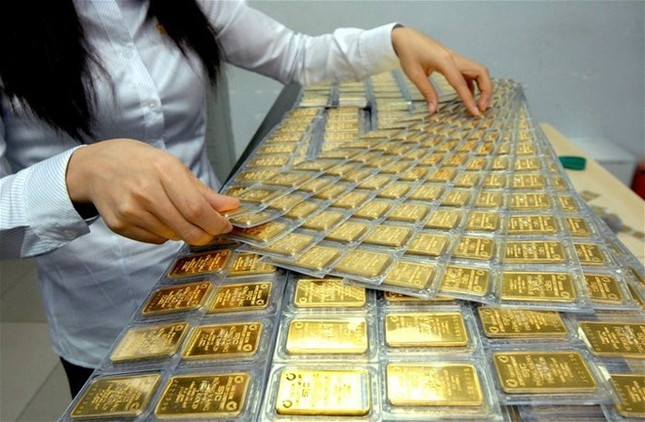Is it legal to ban cash transactions for gold?
Experts believe that the proposal to eliminate cash in gold transactions is necessary. However, it requires additional research since, if adopted now, it would be impractical and maybe unlawful...

Experts argue that limit ing cash payments in gold transactions does not significantly impact the stability of the gold market but primarily affects gold trading businesses. Illustrative image.
To clarify gold trade, the General Department of Taxation (Ministry of Finance) recommended the State Bank of Vietnam (SBV) to investigate and draft legislation requiring non-cash payments in gold transactions.
Business Difficulty – Public Inconvenience
Assoc. Prof. Dr. Đinh Trọng Thịnh, an economic expert, says that gold, as a high-value commodity, naturally fits into the government's approach towards a cashless society.
Currently, the SBV has set a non-cash transaction cap of VND 20 million or more, so gold should be no exception. According to the expert, major gold transactions can be done using bank transfers, while smaller or individual purchases can still be made in cash as normal.
According to Assoc. Prof. Dr. Đinh Trọng Thịnh, regulating restricted cash payments in gold transactions has little impact on the gold market's stability and is mostly focused on gold trading enterprises.
Meanwhile, economist Ngô Trí Long feels the transparency in gold transactions is good but not practicable since gold is different from gasoline, which requires tangible infrastructures and circumstances for issuing invoices. Furthermore, not every person has a bank account, which would cause trouble to the public if controlled in this manner.
Economist Ngô Trí Long explained that gold buyers in Vietnam are diverse, including elderly people, rural residents, and those who buy in small amounts for savings or gifts. These groups often lack technological knowledge or smartphones for bank transfers, making cash payments difficult for them.
Furthermore, he added that the practice of utilizing cash in transactions is still widespread in Vietnam, making an outright ban on cash for any transaction, including gold, impossible.
According to Mr. Long, this idea would only benefit individuals who acquire gold in large quantities for financial purposes. He suggests that the SBV should regulate non-cash payments for gold transactions starting with one gram.
Is the proposal legal?
According to attorney Lê Thị Nhung, Director of Lee and Associates, non-cash payments are now encouraged but not necessary for purchasing things that require them.
Attorney Nhung feels that the General Department of Taxation's plan to prohibit cash transactions in gold dealing is inappropriate. Even she stated that imposing this legislation at this time would be illegal.

The business of gold jewelry and fine arts is moving towards unconditioned business operations, yet the proposal of non-cash transactions in gold trading is contradictory. Illustrative image.
Attorney Nhung went on to say that the newly approved Real Estate Business Law by the National Assembly simply mandates developers and real estate enterprises to receive payments through bank accounts as specified in real estate and service contracts.
Individuals selling houses or engaged in small-scale real estate business... do not need to compel payment through banks, avoiding significant participation in civil transactions.
Attorney Lê Thị Nhung remarked that non-cash payments have lately expanded in the economy, but are still focused in big towns, commercial centers, supermarkets, and restaurants, and are not yet widely used in rural, hilly, and isolated locations. Non-cash payments are becoming more common, yet rural folks who purchase even half a gram of gold find it impossible to make payments through bank accounts.
"Why does gold, simply another product, require a rule prohibiting cash transactions?" attorney Nhung said.
Mr. Huỳnh Trung Khánh, Vice Chairman of the Vietnam Gold Traders Association and advisor to the World Gold Council in Vietnam, noted that currently, 5,835 gold and silver trading businesses are deploying electronic invoices initiated from cash registers, accounting for 80-90% of the industry. This has begun to control these business units. Thus, doing this would add extra complexity to the firm.
He argued that, in truth, no corporate sector has fully implemented non-cash payment requirements. "Why would we want to use it in the gold sector? Countries throughout the world likewise urge decreased cash usage, but no country has passed legislation requiring 100% of any product to be exchanged without cash," Mr. Khánh added.
Mr. Khánh went on to argue that using administrative procedures to enforce non-cash payments in gold bar transactions would push the gold market underground.
Furthermore, the industry of gold jewelry and fine arts is moving toward unconditioned operations, but the idea of non-cash transactions in gold trade creates a paradox.
"To clarify the gold market, authorities should first conduct a poll of people of all ages to learn about their attitudes of the convenience or inconvenience of purchasing and selling gold for cash. Only then should we assess whether to adopt this technique in real life, avoiding implementation challenges," Mr. Khánh said.








